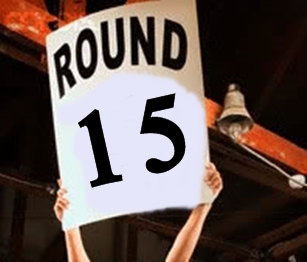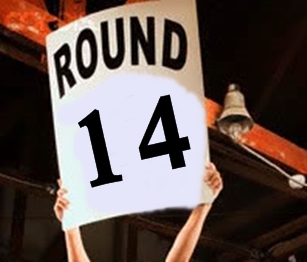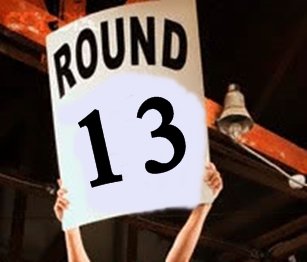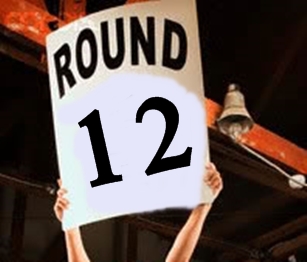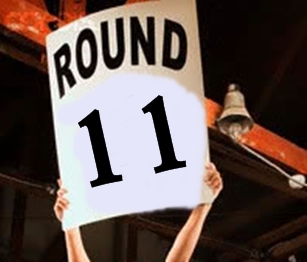Here's a reminder of what is happening. WRiTE CLUB (sponsored by Wild Lark Books) is a tournament-style contest that will run for nine weeks (which includes a week break for the holidays). It provides writers the opportunity to compete against one another for a chance to win a free publication package (along with other prizes). Here’s the kicker—it’s all done anonymously. Writers have submitted 500-word writing samples under pen names. The chosen (decided by a group of twelve slush pile readers) are paired off to go head-to-head in daily “bouts”, with the winner of each match determined by you the reader—by voting for your favorites. Bout winners keep advancing until there are only two remaining and that’s when a panel of celebrity judges, who include well know authors, agents, editors, and other publishing folks, choose the ultimate champion.
2) Although our contestants are anonymous, voters cannot be. Anonymous votes will not count, so if you do not have a Google account and are voting as a guest, be sure to include your name and email address.
3) Using any method (email, social media, text, etc) to solicit votes for a specific contestant will cause that contestant's immediate disqualification. What is okay, in fact, encouraged, is to spread the word about the contest to get more people to vote, just not for a specific writer!
That’s enough of the fine print…here we go!
Finley Shaw and her family usually avoided places like
Rigley-Beck, a dust-ball planet in a desolate part of the galaxy.
Meeting the contact here was Finley’s first clue that
something about this deal wasn’t right.
“Stay alert,” Mom said as they suited up. Mom and Dad tucked
blasters and concussion bombs into their gear. Just in case.
Why had they agreed to this? Dad had two rules: never do business with people you don’t know and stay away from illegal clones. This job broke both rules.
Dad said they needed the money, but Finley thought it was something
more. Dad had done some shady things when he was young and rebellious. Maybe
this was his way of making up for it.
Whatever it was, Finley didn’t like it. But she kept her mouth shut. Questioning Dad’s decisions was pointless when he was so determined. She shouldered her pack and followed Mom, Dad and her older brother Jed down the shuttle ladder.
Rolling terrain, bristling with stunted trees, stretched to
the horizon, greyer than anything Finley had ever seen. The wind, smelling of the
ammonia leftover from the planet’s terraforming days, blew sand into her face.
They headed for a squat corrugated metal building at the edge of the field barely
visible through the forest of fuselage carcasses and old ion engines cluttering
the front yard. Sand rats chased each other around the hull of an old destroyer
half buried in sand.
Who would put a space station in the middle of a junkyard?
Inside, a ceiling fan circled overhead, clicking with each wobbly turn. A man worked behind a counter typing on an ancient-looking keyboard. Eyes bulged in his narrow face reminding Finley of the pop-eye bugs they’d encountered in the Quintero system.
Dad and Mom approached while she and Jed leaned against the back wall.
“What can I do for you folks?” Bug-eye asked, not looking up
from the com-screen.
“Here for Stillwell. Cargo pick-up.”
“Out back.” Bug-eye
hooked a thumb over his shoulder.
Dad murmured “thanks” and headed that way. Finley and the others followed. They entered a narrow yard cluttered with more starship wreckage, surrounded by a tall metal fence.
No Stillwell. Mom and Dad exchanged wary looks, putting Finley on edge.
The “cargo” they’d come for huddled in the shadow of a
lean-to. Ten or so service clones, dressed in faded civilian clothes, not the
usual crisp grey and yellow corporate-clone uniform. They gazed down at their
worn boots or stared blankly ahead, clearly miserable. Outside of
Interplanetary Council protection, unregistered clones usually ended up working
in illegal mines or out-galaxy terraforming projects. But Finley’s family would
be delivering this bunch to a resistance group and freedom.
“Let’s just take the clones and go,” Jed said.
“Not till we get paid.” Dad started for a shed across the yard.
Finley barely had time to process what happened next.
The roar of air-strikers and gunships filled the air, approaching fast.
Dad’s eyes filled with panic. “Run!”
#############################################################################
On the far side of the ring, we have Bashert who represents the Romance genre.
Soulmates
A fake tattoo pressed upon wetted skin, the sunset sky against the surging sea, ink against a crisp white page— that’s how close we were. Only us, no space in between. We moved in concert, our mouths like jellyfish, pushing and receding, palms against skin, goosebumps upon flesh. Our oxygen dwindling, he pulled back.
I stared into his soft-skinned, olive-toned face.
“Who are you?”
His eyes were timber, the cinnamon of flames alighting wood in the dark, dark night. His hair was chestnut, flecked with strands of light. Arms still encasing me, muscular vein splitting the middle of his forearms like a taut guitar string.
His eyebrows crinkled as though he, too, was unsure of the answer.
Around us stretched an expanse, a prism of colors flickering and blinking. Roots floated beneath paper trees into nothingness, pages of books open and murmuring, thoughts and whisperings tied to invisible strings like hanging fruit. It was all so unfamiliar and yet so comfortable, strangely.
“I don’t quite remember….”
He swiveled his head around, searching for clues. With the space left by the absence of his lips, I followed his eyes.
“But I know that I was assigned to you.”
We turned our heads back to each other and our expressions caught in mutual perplexity. Both of us ticked our heads back, turning to one side, and then the other. We each raised an eyebrow, then pursed our lips— mirrors of each other, a reflection of opposites. We stared at each other with a confusion that felt like home.
It was awfully difficult to talk to your soulmate when neither of you knew anything about yourselves.
We could not seem to grasp what we were doing in this place, yet we could not recall being anywhere else.
It wasn’t long before we realized that kissing was the key.
Every time our lips melded, a new revelation surfaced. Eyes closed, tongues pressed together, glimmers of future memories filled the blackness behind our eyes. The recollections appeared distorted, half-blurry, as though reflecting through a crystal prism—the staccato wails of babies crying, tiny boots crunching leaves, grey streets littered with debris. We saw the two of us, in a dim-lit room cocooned by books, youthful hands cradling sleeping beings, wrinkled feet faltering, the echoes of quiet sobbing. Next, we saw the land, a patchwork of ruddiness and green, folded like a pillow beneath our feet. And then there was the taste of dirt, dark and deep, so rich we gulped at each other, desperate to inhale it.
As soon as we surfaced, we asked the question burning both of our minds: What is this place?
It was a sort of “World to Come,” but reversed, the answer arrived, granting only more bewilderment. What was the “World to Come” when we had no knowledge of a “World In The Moment”? Why was it “to come” if we were already in it? And what about the leaking memories?
What had come already?
Leave your votes and critiques in the comments below. Again, be respectful of your remarks and try to point out positives as well as detractions.

